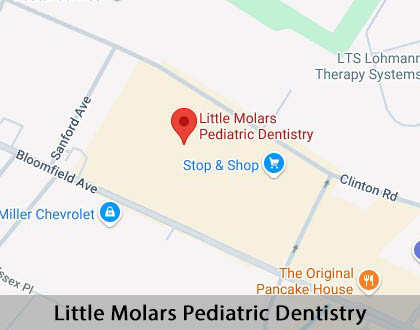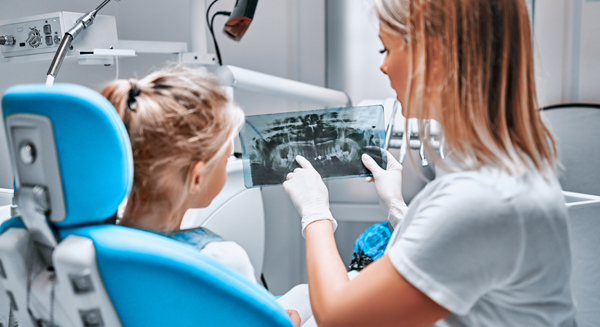Pediatric Dental Technology West Caldwell, NJ
Pediatric dentists utilize pediatric dental technology to provide patients with safe and effective dental care. Using the appropriate diagnostic and treatment tools allows these specialists to provide quality care while making visits stress-free for parents and children. To best serve their patients, pediatric dentists use specific technologies to make the dental experience as painless and easy as possible.
Little Molars Pediatric Dentistry provides pediatric dental technology in West Caldwell and the surrounding area. Our team can provide your child with the dental care they deserve. Call us at (862) 451-8222 to learn more about our services.
Imaging Tools
Imaging tools can help provide more information about a child’s dental health to aid in diagnosis. This technology captures detailed images of the teeth, jaws, nerve pathways, gums, joints, and facial structure from different angles. Such tools may include X-rays and intraoral cameras. X-rays are an important part of a child’s preventative and diagnostic care. We can use this tool to detect various jaw formation issues, other problems, diagnose diseases, and plan treatments accordingly.
Depending on the patient’s needs, there are various types of X-rays for children, such as occlusal, computed tomography (CT), and panoramic X-rays. Intraoral cameras provide a detailed view of a child's mouth in pictures and videos. This imaging tool puts specific problem areas onto a computer screen allowing for greater clarity and detail. Our team uses various factors when choosing the right imaging tool for a child, such as their age and dental history.
“X-rays are an important part of a child’s preventative and diagnostic care.”
Diagnostic Tools
Pediatric dentists use diagnostic tools to help identify oral diseases and abnormalities. Imaging technology is also an important diagnostic tool for dental issues such as cavities. Three-dimensional imaging increases the accessibility of complex craniofacial structures for early and accurate diagnosis of mild to severe conditions. Additional diagnostic tools include air abrasion systems or laser fluorescence devices.
According to the U.S. National Library of Medicine , air abrasion systems can diagnose small cavities without using a dental drill. This handheld device uses a stream of compressed air to blow particles into a particular tooth area, clearing away debris and allowing for a diagnosis. Air abrasion is a quick, easy and painless way to determine whether a cavity is present and fillable. Laser fluorescence devices apply laser energy of a specific wavelength to reveal bacterial byproducts called porphyrins that will fluoresce red. In some cases, this diagnostic tool can outperform radiographs or visualization when diagnosing cavities.
“Pediatric dentists use diagnostic tools to help identify oral diseases and abnormalities.”
Injection Systems and Sedation Tools
Injection systems and sedation tools allow children to remain safe and comfortable throughout the treatment process. They are crucial parts of pediatric dentistry since many children have dental-related anxiety and fear of needles. Injection systems use computerized technology to reduce the sensation of being injected with a needle.
They control the rate of anesthetic delivery and the amount of pressure used. Injection systems increase control when numbing a single tooth, thereby avoiding the large fields of numbness that can occur when using a syringe. Sedation tools can also help pediatric patients overcome their fear and anxiety. One common method for pediatric sedation is nitrous oxide gas.
Nitrous oxide is a mild sedative that helps patients safely and effectively manage pain and anxiety during dental treatment. Children receiving this sedation method will wear a mask over their nose and breathe in the nitrous oxide gas. Other sedation methods may include the administration of a sedative medication orally or through an intravenous line.
“Injection systems and sedation tools allow children to remain safe and comfortable throughout the treatment process.”
Check out what others are saying about our dental services on Yelp: Pediatric Dental Technology in West Caldwell, NJ
Digital Dental Records
Advances in pediatric dental technology also include the safe and efficient management of patients’ dental records. Digital dental records reduce paper and increase office productivity compared to traditional record-keeping. These computerized versions of a patient’s complete dental history are much easier to store, track, and protect.
Digital dental records make the transmission of records quick and efficient when a patient needs to see a dental specialist or receive a copy of their dental records. Digital records also allow for more thorough and legible record-keeping without taking extra time. The result is enhanced communication, better treatment outcomes, and information integrity.
“Digital dental records reduce paper and increase office productivity compared to traditional record-keeping.”
Questions Answered on This Page
Q. What types of imaging tools do pediatric dentists use?
Q. What tools does a pediatric dentist use to make a diagnosis?
Q. What is an injection system?
Q. What are digital dental records?
People Also Ask
Q. How do I find the right dentist for my child?
Laser Dentistry
An example of emerging technology in the field of pediatric dentistry is laser-based therapy. Pediatric dentists can use lasers in various ways, including preventing, diagnosing, and treating cavities. Laser dentistry may be ideal for pediatric patients undergoing a procedure on their gums or treatment for a gingival disease.
This is due to laser dentistry’s removal of the need for anesthesia. Laser dentistry is precise, without bleeding or stitches. These benefits can help reduce anxiety in children who may fear going to the dentist or pain.
“Pediatric dentists can use lasers in various ways, including preventing, diagnosing, and treating cavities.”
Frequently Asked Questions
Q. What is a computed tomography (CT) scan?
A. A CT scan provides a detailed three-dimensional image of teeth, nerves, and bones. It may be helpful when regular dental or facial x-rays are not sufficient. These scans can help determine the proper diagnosis and treatment plan.
Q. Will sedation with nitrous oxide put my child to sleep?
A. No. Nitrous oxide does not put patients to sleep. Patients can still hear, see and follow directions when under the influence of nitrous oxide, and their breathing is not affected. However, nitrous oxide does lessen feelings of anxiety and decrease any painful sensations.
Q. Why is laser dentistry helpful for children?
A. Lasers are minimally invasive, which is a major benefit when it comes to pediatric patients. According to the American Academy of Pediatric Dentistry (AAPD), they also can decrease the need for anesthesia or stitches. For patients who have a strong gag reflex, lasers can be helpful because they allow for a narrow working field. Laser technology is also anti-microbial, which helps reduce the chances of infection.
Q. When are dental X-rays necessary?
A. Patients will usually have X-rays taken yearly. Factors that will affect how often a child needs to receive X-rays may include their age, current oral health, symptoms, and history of gum disease or tooth decay. Children may need dental X-rays more often than adults to monitor the growth of their adult teeth.
Q. Are dental X-rays safe?
A. According to the American Dental Association, X-rays are safe. Although X-rays involve radiation, the exposure levels are very low and are considered safe for children and adults. Our team will take the necessary precautions to keep patients safe and prevent any unnecessary radiation exposure.
Quality Pediatric Dental Services Can Transform Smiles
By visiting us as soon as possible, our team can help get your child the professional treatment they need.
Definition of Pediatric Dental Terminology
Call Us Today
Advances in pediatric dental technology provide patients with safer and more effective treatment. Little Molars Pediatric Dentistry can provide your child with the gentle, comprehensive care they deserve. Call us today at 862-451-8222 to learn more about our services or schedule an appointment.
Helpful Related Links
- American Dental Association (ADA). Glossary of Dental Terms. 2024
About our business, license, and website security
- Little Molars Pediatric Dentistry was established in 2023.
- We accept the following payment methods: Cash, Discover, MasterCard, and Visa
- We serve patients from the following counties: Essex County
- We serve patients from the following cities: West Caldwell, Caldwell, North Caldwell, Fairfield, East Hanover, Montville, Verona, and Montclaire
- Norton Safe Web. View Details
- Trend Micro Site Safety Center. View Details







